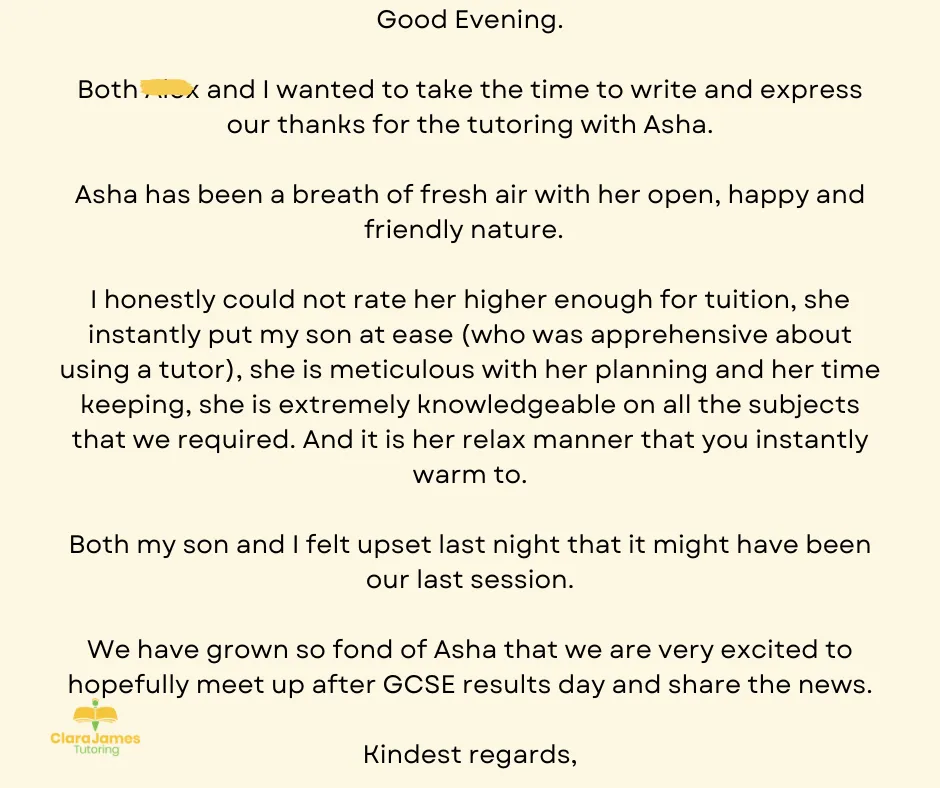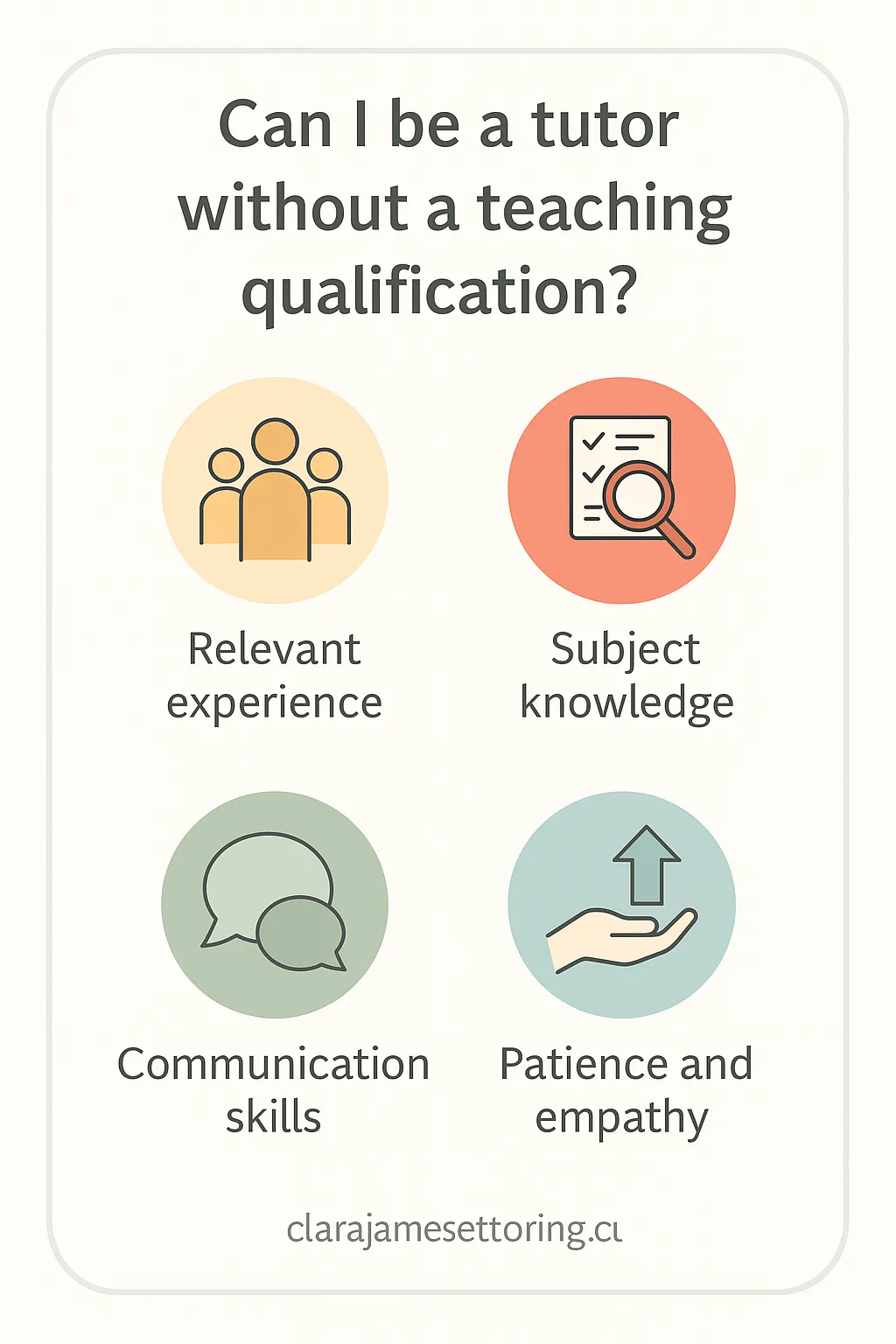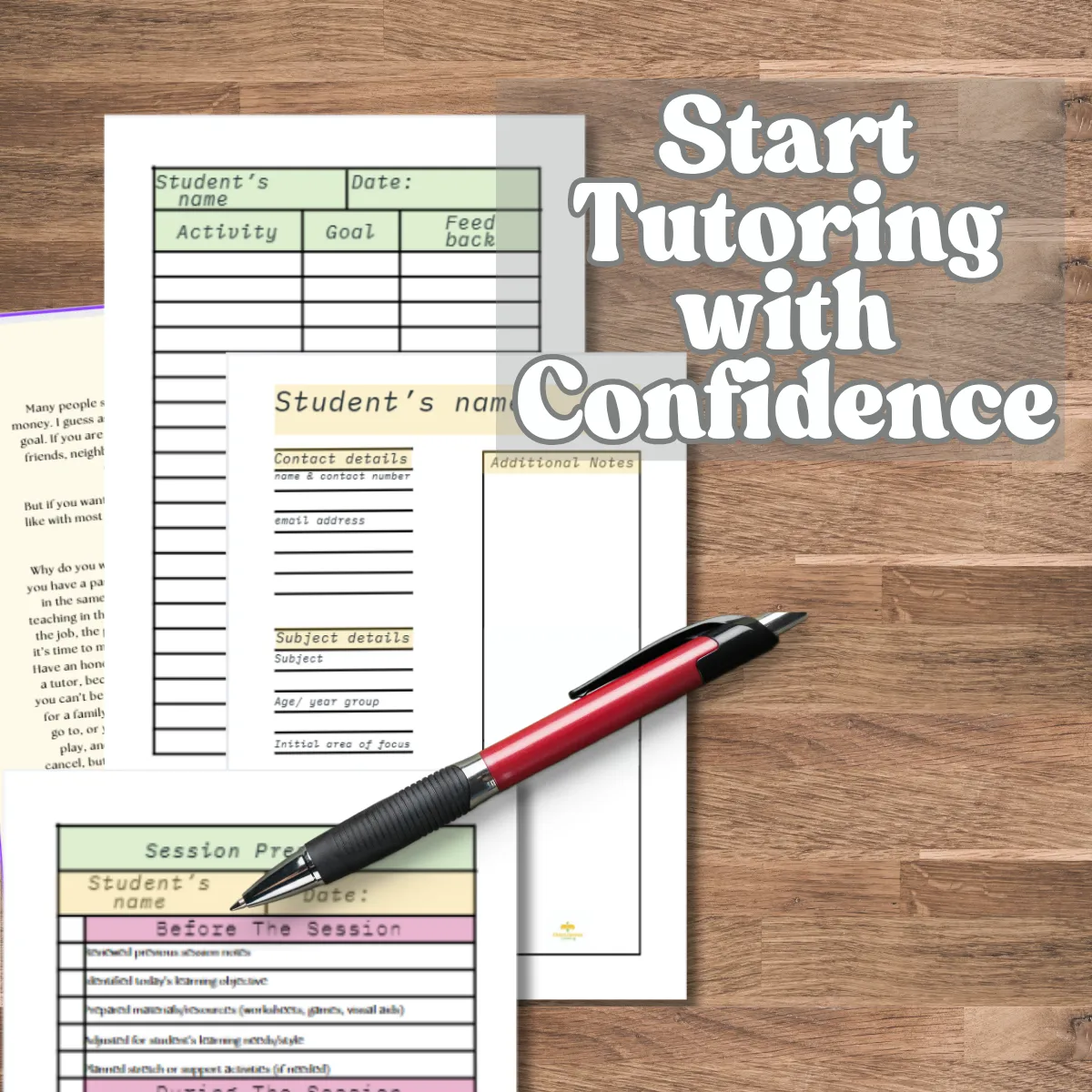
You can be a tutor without a teaching qualification
Presently, in the UK there are no legal requirements of the qualifications needed to become a tutor. There is a presumption that you need to own a teaching qualification, and it is what a lot of parents are looking for, however, no matter what qualifications you hold there is nothing to stop you from getting started. This is why a lot of A-level students and university students tutor to help finance them through their studies.
If you'd rather not read the whole article. listen to it here
Do I need a teaching qualification to be a tutor?
When I started tutoring, I didn’t have a teaching qualification. I had completed a Diploma in Pre-school Practice just over 10 years previously, that then gave me the confidence to do my degree. I had 3 young children under the age of 5 at the time, so going to university to do it wasn’t practical so instead I did a degree in childcare and education through the Open University as a correspondence course.
To be honest, for me a teaching qualification would be wasted as I wouldn’t have had the confidence to stand in front of a class of 30. I am sure they would have noticed my fear and made mincemeat of me in seconds.
At the same time as doing my degree I gained an interest in different learning styles and completed numerous different courses on it. But I had no intention of becoming a qualified teacher.
So, when a friend suggested that I ought to have a go at tutoring I didn’t feel qualified, either emotionally or through my qualifications. I had no knowledge of the curriculum, I had no confidence, and I wasn’t a teacher. In my mind that was a hattrick of reasons why it wouldn’t work!
She talked me into it and within 6 months I had enough tutoring work to leave the job that I had found myself in. That was in 2012, and the business has continued to thrive since then.
Will anyone hire me without a teaching qualification?
Over the years I have employed a number of tutors to work with me. Some have been qualified teachers, some have been A-level students. Some are retired engineers, some are Mums who have enjoyed supporting their own children. Some have been trainee doctors. Some have been great, some have been awful…

Asha was a university student at the time I received this email from a parent regarding their lessons,
What do I need instead?
What I have found to be the most important value that a tutor holds is their compassion, their willingness to work at the speed of the child and to find the route that works best for that child. To be flexible in how they present the resources and the information and to build a rapport that offers the child, the student to feel confident in asking questions and to relax.
Several years back a lady came to work with me. She was lovely and had worked as a head mistress and taught English for over 30 years. It had taken her all around the world.
She seemed perfect. I gave her the details of the first family and off she went. I followed up after and the family informed me that they wouldn’t be continuing. The same happened with the second family. The third family had been on the phone before I had a chance to call them. She had come in with no idea of what their son’s capabilities were and just presented the lesson as if she was talking to a full class and had not acknowledged him as an individual.
The Mum was fuming.
Unfortunately, that tutor no longer worked for me after this,
I couldn't give her any more work.
On paper she was exactly what many parents asked for, in reality she was so fixed on doing things the way she always had, she couldn’t adapt to meet the needs of the individual rather than the class.
Having said that you will need to have a good knowledge of the subject.
In part this is because if someone doesn’t understand your explanation the first time you will need to be able to explain it from a different angle and often the ability to answer the question yourself doesn’t mean that you can do this.
Over the years I have also found that, some of the most intelligent people in that field, have actually made some of the worst tutors because they see the basics as common sense and as such find it more difficult to break it down and explain it. In their own mind it just seems that they can’t grasp why you don’t grasp it.
A Mum got in touch a couple of years ago. Her son had been in and out of hospital and consequently missed a lot of school. This led him to being behind in some subjects and lacking confidence across most areas of the school curriculum.
One parents’ evening this was mentioned, and the goal was set that he would put his hands up more in class. So, over the coming weeks he endeavoured to conquer his fear and put his hand up. On one occasion, he had put his hand up in class to ask a question. The teacher had repeated themselves and he had still struggled to understand it, so the teacher had rolled their eyes and said, “good luck to you in your exams if you don’t get something as simple as that”.

I don't have a teaching qualification, but I will always do my best to support a child in the way that is best for them
I often have conversations with people considering whether it is the child who is at fault for not getting it, or the teacher/tutor who is at fault for not explaining it in a way that makes sense to that specific child.
I think that is the key ingredient needed of any tutor is the ability to look at a problem from multiple angles and find the one that works best for the child they are working with and if it takes them a hundred attempts to find the right explanation, so be it. Their job is to help the child to understand, not to belittle the child for not understanding.
Experience had taught me over the years that communication with both children and parents is key. We need to be able to communicate with the children so that they feel comfortable to ask questions and to be able to concentrate on the task at hand rather than to focus on their desire to escape this situation.
However, we also need to remember that it is the parents who are paying for our time and knowledge. They want to be kept informed as to what they are paying for. Prior to lockdown all our lessons occurred in the student’s home. I was a firm believer that if they were in an environment where they felt relaxed and comfortable, they would be better able to focus on the lesson. However, lockdown put an end to that and we also started offering online lessons.
There is a definite comparison between the rapport you have with the parents and how they recommend you forward and the interaction you have with them. Very often online, especially with the older students the time ends and that’s it. You don’t interact with the parents. You will need to message them and inform them how the lesson went. Which is appreciated generally but feels more stilted, less emotive. However, when you are in their home speaking to them face-to-face you can build up much more of a relationship, get to know them and talk more freely.
This relationship is crucial helping your business to grow.
But it is not only your business your bottom line that you should be interested in growing, but also more importantly than anything else, helping those that you work with to grow in both knowledge and confidence.
What do parents look for in a tutor?
When a parent gets in touch offer them helpful tips and advice.
Don’t make getting them to sign up to be your main priority, make sure that you instead focus on helping them. The more you genuinely appear to care and want to support them, the less concerned they will be as to whether you are a qualified teacher. What they inevitably want is the best for their child and if that is the person talking to them right now that isn’t a teacher but is clearly passionate, clearly understands their child’s needs, that’s what will be their priority (99% of the time).

Your reputation has the power to drive your
earnings up significantly
Where do you start (Practical First Steps)
How to Get Started as a Tutor (Without a PGCE (Postgraduate Certificate in Education))
So, you’re not a teacher but you are confident that irrespective of that, you will be a great tutor because you care, because you will put your heart and soul into giving the best possible support that you can.
So, where do you begin?
Break down the starting process:
* Pick your subject(s) and age range
* Decide on in-person or online tutoring
* Set your pricing and availability
* Plan out a basic first lesson or assessment
* Apply for your DBS check if you don’t have one
* Start telling people about your new enterprise
That’s the first basic steps. Don’t try to be everything to everyone. You will make a lot of extra work for yourself but additionally, as implausible as it sounds you will also find it harder to get started. The more you can specialise, the more niche you can be, the more your reputation will grow.
These days many of the parents who get in touch with us are those whose children are neurodivergent and are struggling in the classroom setting. They are looking for something different, something that will embrace their child’s own unique needs. They are not looking for a teacher to continue the curriculum at home.
What if I’ve never worked with kids before?
Before we move on, I feel I should admit that prior to starting my Diploma in Pre-school Practice I was terrified of kids. I had never had any interaction with them (apart from my own). People that did interact well with them seemed to be confident, energetic, almost childlike (in a positive way) themselves. I was none of those things. I am quiet and socially quite awkward. Yet, I needed, wanted to do something with my life and with 3 very young kids this seemed to be my only option.
Then when I was asked by a friend of my ex-husband if I could help her daughter with her GCSEs, I was terrified. If young kids were scary, well teenagers had the reputation of being terrifying. Yet actually they are some of the nicest people you will ever meet. I am so glad I took that plunge, because had I not have done I would have missed out on so much. They have taught me so much and given me so much more confidence over the years and I feel it is I who should be thanking them.

How to Build Confidence if You Feel Inexperienced
When I first started tutoring, I didn’t tell anyone close to me what I was doing for several weeks. I lived in dread that they would find out, because I wasn’t a qualified teacher. I thought they would judge and if I failed, they would judge me even me.
The first lesson I ever went to, I was told go to the crossroads, turn left, keep going and the cottage was right at the end of the lane.
Simple.
I followed the directions and pulled up outside this large house. It didn’t look like a cottage, but I presumed we all perceive things differently. A lady came marching out and asked what I wanted.
I explained that I was there to see her daughter. I was the tutor, Dawn.
She told me I had the wrong house, and I apologized profusely, as she clearly wasn’t impressed that I was there and got back in the car.
I was already a bag of nerves. Now I just wanted to cry. I wasn’t sure that I wanted to tutor anyway. What if I wasn’t good enough? What if they shouted at me for not delivering what they wanted? What if…?
As I pulled out of their drive, I noticed a small cottage tucked away behind some trees. That must be it.
Should I knock or just drive home and forget the whole stupid idea.
I got out of the car. Grabbed my bags from the boot, put a smile on my face and knocked.
If you feel the same way as I did, don’t worry, you’re not alone in this. Confidence is often the biggest blocker for new tutors.
Offer free or discounted lessons
What I would suggest is that you start by offering a few free or discounted lessons. You might do this for friends and family, or you might offer them to people in your neighbourhood or put a request in a local Facebook group explaining your situation and asking if anyone would like to have a free/ discounted lesson in return for honest feedback that can be used as a testimonial.
Create a template or lesson plan
Create a template or lesson plan (I have created one in my Starter Pack if you are interested). This way you can be sure that you will remain focused, have the required resources and the relevant knowledge needed to present the lesson. Check with the parents what they would like you to focus on. I often send a copy of the lesson plan to the parents in advance so that they are aware of what we will be doing and how. Let them know that it is just a guide, but it will give them confidence in you and that in turn will give you confidence in yourself. It also means that if they do have any issues with your plan, they can inform you prior to your arrival rather than “criticising you” to your face…
Gather testimonials from happy parents early
I admit I am a hypocrite here as I know I should ask for testimonials. But I was brought up to be self-sufficient and not ask people for things and although I am now 50, it is still something I struggle with… However, sometimes we need to get over ourselves and just ask. If parents are happy, they will on the whole be more than willing to write a testimonial for you to use to help you to get started or grow.
Reflect on what worked and what didn’t after each session
At the end of each session look back on what worked and what you perhaps need to tweak. The more you do this, the more confident you can be that you are building on the aspects that are going well. Growing those seeds and ensuring that what you are providing is going from strength to strength.

There are no legally required qualification to become a tutor just the requirement to care and support the child in the way that suits them as an individual
What to Do About Legal/Practical Bits
Get a DBS check (if working with children)
You can get a a DBS check done for yourself through companies like Ucheck, at the moment it costs roughly £66, but it will again give parents confidence in you.
Register as self-employed with HMRC (in the UK)
This is essential so that you can ensure that you are not fined at a later date for not declaring your earnings. Although it may seem a long way off before you find your find student that you support, you never know what is around the corner.
Set up basic terms and conditions
This will ensure that it is clear what they can expect from you as a tutor, and what you will expect in return.
Use a simple invoice system:
I use Free Agent. I chose it because it was cheap when I first set up and easy to use. Is it the best? I’m not sure, there are many out there and it is probably worth doing some research into it, however they do give you the ability to send out professional invoices and keep a record of the invoices paid and outgoing. This is paramount as without the receipt of payments, you will never create a profitable business, it may be nothing more than a hobby, or even worse, it may create a loss for you. So, please do be organised with your money.
Just as a side note, because I didn’t have a teaching qualification, I very much questioned my worth as a tutor, however as you start to earn more of a profit from your business it will be reassuring that you are worthy and that you are doing a good job.
How the Clara James Tutor Support Group Can Help
From early on in building the business I took courses, read books, found mentors to guide me so that I could give the very best support that I possibly could. But over the years I have struggled to find those who support tutors. I belong to a mentoring group for the online aspect of the business, one for marketing and customer service, but no one that could answer the questions directly associated with tutoring. So, I decided to try to create the support that I would have appreciated in the early days of tutoring for others to focus on.
In the past few weeks, I created a “Start Tutoring with Confidence” pack to help you take that first step. The goal is that it will provide you with a practical, encouraging resource providing you with the tools and support you need to help you feel ready, professional, and clear about what you offer.

Remember you are not alone; you just have to take one step at a time to help you to reach your goal. I am here to help you if you need it.
And remember, you don’t need a certificate to care. You don’t need years of teaching experience to help a child understand something for the first time. You just need the right support and the courage to start.
FAQ
Can I be a tutor without a PGCE (Postgraduate Certificate in Education)?
Yes, indeed you can.
Will anyone hire me if I don’t have a teaching qualification?
Yes, and if not, maybe you could start your own tutoring business and support the child in the way that you deem to be the best. It might be slow at first, but with hard work and persistence it can be done.
What if I’ve never worked with kids?
No problem, providing you have the ability to share the information in a way that they will understand it, at a pace that is appropriate for them, you have the ability to tutor.
What should I say when parents ask about my qualifications?
Be honest. Tell them about your relevant life experiences, tell them about your interests, your passions, why you do your very best to ensure that you will be the best possible tutor for their child. Talk with honesty and passion. Talk from the heart.
Do I have to register somewhere to become a tutor?
Not to become a tutor, but remember to register with HMRC if you are here in the UK and to get a a DBS check done.
Ready to get started?
Download the "Start Tutoring With Confidence Pack"

Copywrite: Clara James Tutoring 2025

